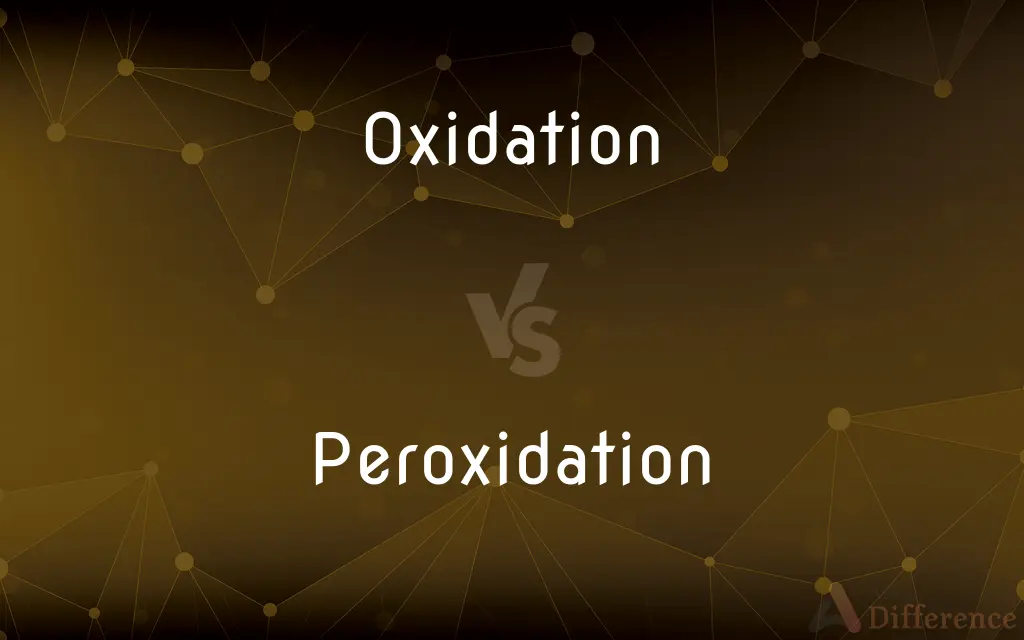Oxidation vs. Peroxidation — What's the Difference?
By Fiza Rafique & Urooj Arif — Updated on May 8, 2024
Oxidation involves the loss of electrons or increase in oxidation state; peroxidation specifically refers to lipid oxidation, forming peroxides.

Difference Between Oxidation and Peroxidation
Table of Contents
ADVERTISEMENT
Key Differences
Oxidation is a chemical reaction where a substance loses electrons, often involving oxygen but not exclusively. Peroxidation, on the other hand, is a type of oxidation that specifically involves the formation of peroxide linkages in molecules such as lipids.
In oxidation, any element or compound can participate, leading to a wide range of chemical reactions. Whereas peroxidation typically affects lipids, particularly polyunsaturated fatty acids, leading to cellular damage.
The general result of oxidation can vary from harmless to beneficial, or destructive, based on the context, like rusting of iron or cellular respiration. Conversely, peroxidation is almost universally damaging, particularly in biological systems where it can lead to oxidative stress and associated diseases.
Oxidation reactions are central to many industrial processes and are intentionally harnessed for energy production, manufacturing, and waste treatment. In contrast, peroxidation is primarily a concern in food preservation, health, and disease contexts, where antioxidants are used to mitigate its effects.
Both processes are influenced by catalysts and environmental conditions, but the prevention strategies differ significantly. Antioxidants are often used to inhibit peroxidation in biological and food systems, while oxidation may be controlled or promoted depending on the desired outcome.
ADVERTISEMENT
Comparison Chart
Definition
A reaction involving the loss of electrons.
Oxidation of lipids leading to peroxide formation.
Common Participants
Metals, non-metals, organic compounds.
Primarily lipids, especially polyunsaturated fats.
Typical Products
Various, including oxides and other compounds.
Peroxides, such as lipid peroxides.
Impact
Can be beneficial, harmful, or neutral.
Generally harmful, causing oxidative stress.
Prevention/Control
Varies widely, often controlled by catalysts.
Primarily prevented using antioxidants.
Compare with Definitions
Oxidation
May occur with or without oxygen.
Sodium oxidation in chlorine to form salt.
Peroxidation
Specific oxidation that leads to peroxide formation in lipids.
Peroxidation of cell membranes can damage cells.
Oxidation
Essential in energy production and industrial processes.
Oxidation reactions are central to the operation of batteries.
Peroxidation
Commonly observed in biological systems.
Peroxidation is a pathway to cell aging and disease.
Oxidation
Involvement in increasing oxidation state.
Copper oxidation changes from Cu to Cu²⁺.
Peroxidation
Often results in oxidative stress.
Peroxidation byproducts are toxic to cells.
Oxidation
Can lead to corrosion and degradation.
Oxidation of aluminum leads to its surface tarnishing.
Peroxidation
Accelerated by light and heat exposure.
Food storage away from light reduces peroxidation.
Oxidation
The process of losing electrons in a chemical reaction.
Iron undergoes oxidation to form rust.
Peroxidation
Prevention focuses on using antioxidants.
Vitamin E protects cells from peroxidation.
Oxidation
The process or result of oxidizing or being oxidized.
Peroxidation
(chemistry) Any oxidation reaction, especially of an oxide, that produces a peroxide
Oxidation
The combination of a substance with oxygen.
Peroxidation
(organic chemistry) The reaction of a double bond with a peroxide
Oxidation
A reaction in which the atoms of an element lose electrons and the valence of the element is correspondingly increased.
Peroxidation
Act, process, or result of peroxidizing; oxidation to a peroxide.
Oxidation
The combination of a substance with oxygen.
Oxidation
(chemistry) A reaction in which the atoms of an element lose electrons and the oxidation state of the element increases.
Oxidation
The act or process of oxidizing, or the state or result of being oxidized.
Oxidation
The process of oxidizing; the addition of oxygen to a compound with a loss of electrons; always occurs accompanied by reduction
Common Curiosities
What is peroxidation?
Peroxidation refers specifically to the oxidation of lipids, resulting in peroxide formation.
What is oxidation?
Oxidation is a chemical reaction where a substance loses electrons, which may or may not involve oxygen.
How do oxidation and peroxidation differ in their effects?
Oxidation can have a range of effects from beneficial to harmful, whereas peroxidation is generally harmful, leading to cellular damage.
Can oxidation occur without oxygen?
Yes, oxidation can occur without oxygen, involving other elements like chlorine.
How can peroxidation be detected in foods?
Peroxidation in foods can be detected by specific tests that measure levels of malondialdehyde, a marker for lipid peroxidation.
Are all oxidation reactions harmful to industrial materials?
Not all oxidation reactions are harmful; some are deliberately used in processes like passivation, where a protective oxide layer is formed to prevent further corrosion.
What are the environmental implications of oxidation?
Oxidation reactions can affect environmental health, for example, by contributing to the formation of acid rain and photochemical smog.
Can peroxidation affect the taste and quality of food?
Yes, peroxidation can significantly degrade the quality and taste of food by altering its flavor and causing rancidity, especially in oils and fats.
How does the body naturally combat peroxidation?
The body uses enzymes like superoxide dismutase and glutathione peroxidase, along with dietary antioxidants, to combat peroxidation.
Is oxidation reversible?
Some oxidation processes are reversible, particularly in controlled chemical reactions, while others, like the rusting of iron, are not easily reversible.
What are common sources of antioxidants to prevent peroxidation?
Common antioxidants include Vitamin C, Vitamin E, and various phytochemicals found in fruits and vegetables
What advancements are being made to prevent peroxidation in healthcare?
Advances include the development of more effective antioxidant drugs and therapies, and better understanding of oxidative stress mechanisms to improve preventive measures in healthcare settings.
What role does peroxidation play in diseases?
Peroxidation leads to the formation of harmful byproducts that can damage cellular components like DNA, proteins, and membranes, contributing to diseases such as Alzheimer's and heart disease.
Why is oxidation important in biological systems?
Oxidation is crucial in biological systems as it drives processes such as cellular respiration, which is essential for producing the energy needed by cells.
What are the industrial uses of oxidation?
Industrial uses of oxidation include water treatment, where it helps in disinfecting and decomposing pollutants, and in the synthesis of chemicals.
Share Your Discovery

Previous Comparison
Somersault vs. Somerset
Next Comparison
Wagon vs. CarAuthor Spotlight
Written by
Fiza RafiqueFiza Rafique is a skilled content writer at AskDifference.com, where she meticulously refines and enhances written pieces. Drawing from her vast editorial expertise, Fiza ensures clarity, accuracy, and precision in every article. Passionate about language, she continually seeks to elevate the quality of content for readers worldwide.
Co-written by
Urooj ArifUrooj is a skilled content writer at Ask Difference, known for her exceptional ability to simplify complex topics into engaging and informative content. With a passion for research and a flair for clear, concise writing, she consistently delivers articles that resonate with our diverse audience.
















































